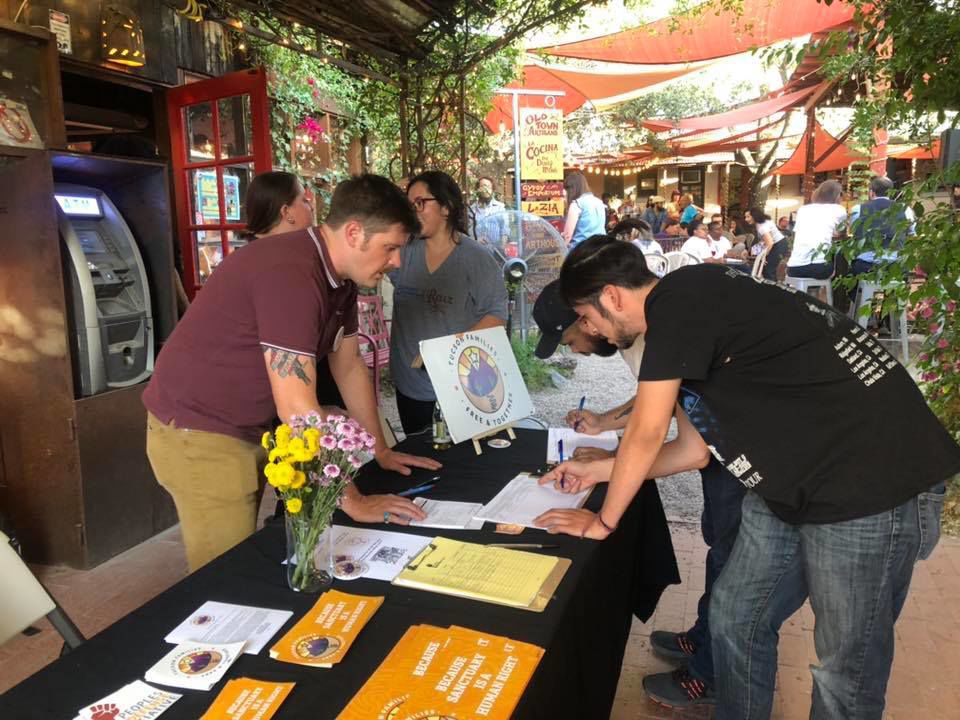The following is the opinion and analysis of the Arizona Daily Star Editorial Board.
The Star’s Editorial Board endorses candidates and ballot propositions that we conclude, after much research and discussion, are the best option.
We make endorsements because voters are busy, and we view it as a community service. We have more access to candidates than the average voter, and it is our job to pay close attention to what’s happening in our communities year-round.
The Star's news reporters don’t weigh in on the Editorial Board’s endorsements (or other opinion content), and we on the opinion side don’t weigh in on news coverage.
Advertisers do not get a voice in the Star’s endorsements, nor in our news coverage.
The Editorial Board includes: President and Publisher John D’Orlando, Star editor Jill Jorden Spitz, Opinion editor Sarah Garrecht Gassen and opinion writer Edward Celaya. Cartoonist David Fitzsimmons is not part of the board.
Please send comments or questions to sgassen@tucson.com
Supporters and opponents of Tucson Proposition 205 “sanctuary city” initiative are united in a significant way: Fear and a sense of powerlessness before outside forces undergirds both camps.
Neither fear is unfounded.
Prop. 205, known as the “Tucson Families Free and Together Ordinance,” aims to protect city residents, including those without proper immigration documents, from being detained or deported because the Tucson Police Department is required by state law to, in certain circumstances, inquire federal authorities about a person’s immigration status.
They want families to be able to live without fearing that any contact with TPD, even as a crime witness or passenger in a traffic stop, could end in federal custody for immigration violations. Their initiative seeks to render impotent the last portion of the odious anti-immigrant law SB 1070 by providing clarity to the law’s vague language.
Opponents from the group No on 205 fear that, should Tucson voters approve Prop. 205 and label ourselves a sanctuary city, we will make ourselves an easy and vulnerable target not only for expensive lawsuits but for state officials who have already said passage would prompt them to hold hostage millions in Tucson’s own tax revenue.
The initiative’s requirements would also cost Tucson millions in federal grants and public safety partnerships with federal agencies, they believe, because it would prevent TPD from working with federal law enforcement unless those agencies agreed in writing to give up their standing to make arrests or detentions.
Prop. 205 supporters are confident that the initiative is watertight and could withstand any legal challenge. However, with provisions that would make it “not practicable” for TPD to make an immigration status check during most traffic stops we cannot credibly believe the city could escape a costly and lengthy legal challenge.
The Arizona Daily Star Editorial Board supports the goal and mission of Prop. 205, but we cannot support this specific initiative.
There is another way, albeit an imperfect way, to accomplish many of the Tucson Families Free and Together goals: Work with the Tucson Police Department, the various TPD advisory boards, community groups and the Tucson City Council to revise the TPD general orders that govern how the force operates.
TPD and city officials point to these general orders in arguing against Prop. 205, saying that TPD has found a way to stick to the letter of the law — that if an officer has “reasonable suspicion” a person they’ve detained may be in the country unlawfully, and if it is “practicable,” and would “not hinder or obstruct an investigation,” they must attempt to determine the person’s immigration status.
The general orders do state that “officers will not make immigration status inquiries during consensual contacts with members of the public,” referring to crime victims and witnesses, and that “suspicion of unlawful presence in the United States is not a legal basis for a stop or detention.” Passengers in traffic stops, it notes, are not required to provide identification or name “unless they are suspected of a criminal violation.”
When determining if an immigration status check is “practicable, officers should consider things such as workload, criticality of incident and of other present duties, available personnel on scene, location, available backup, ability to contact ICE/CBP and availability of ICE/CPD,” according to the General Orders.
Prop. 205 supporters rightly point out that, should city or TPD leadership drastically change, the General Orders could be altered for the worse but an initiative passed by voters would remain intact.
We think the far bigger risk, and the stronger likelihood, is that the inevitable legal challenge would result in an interpretation that strips TPD officers’ ability to determine what is practicable in a given situation or when an immigration status check would hinder or obstruct an investigation.
Some of the initiative provisions are already included in the TPD general orders, but there are others that should be incorporated. Among them:
- That TPD officers would not inquire or check a person’s immigration status in a school; hospital, medical clinic or nursing home; church or house of worship; and state or local court building.
- That a person’s ability to speak English, speech pattern or perceived accent should not be included when determining if there is reasonable suspicion that a detainee is in the country unlawfully.
- That an officer not detain a person based on “that person’s race, color, ethnicity, ability to speak English, mode of dress, religion, national origin, sex, gender identity, sexual orientation, disability, economic status, and familial or marital status, unless such factor is part of a specific suspect description linking that person to a particular crime.”
We join organizers of Prop. 205 in their opposition to President Trump’s inhumane immigration enforcement practices and the fear they, and SB 1070, have wrought on Tucson families. We cannot, however, support this particular initiative because there is another way to incorporate many of the same protections.





